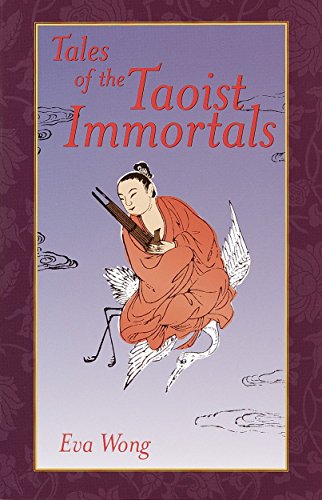معلومات عنا
دعم العملاء
احصل على التطبيق

قم بتوجيه الكاميرا لتنزيل التطبيق
حقوق الطبع والنشر © 2024 Desertcart Holdings Limited




Full description not available
W**D
Interesting stories, but no context
In her introduction, Wong states her objections to other books that come across as dry, historical records. She wants the voices of the masters, not lists of dates and places. She has written her book accordingly. These are readable, non-academic stories of Taoist sages and masters. Dozens of different masters are presented, each in a short and readable anecdote. At the end of the story about some master, a few lines state the era and area in which [s]he lived, if known.This book's goal is its weakness, however. It present each famous name in isolation, with no organization by place, time, or school of thought. It's almost impossible to get any sense of continuity, or sense of which sages lived at the same time. Some are simply identified as having lived in some dynasty - a span of a thousand years. It would have been nice if the information were just a little more specific.Also, the relationships between different immortals and different Taoist traditions are rarely spelled out. Chuang Tzu, a major author, gets the same three or four pages as any other. The more practical sages are lumped in with the ones who founded the alchemical tradition, blurring distinctions that I find worthwhile.It's an interesting and lively set of stories, but unsastisfying for any reader who wants more historical information.//wiredweird
L**O
Beautiful, Entertaining and Instructive
The stories in this book are from Eva Wong's childhood - stories told about Chinese heroes and Taoist Immortals.Stories are divided into five sections; The Eight Taoist Immortals, Sages, Magicians, Diviners and Alchemists.In Taoist tradition, the stories of immortals are meant to teach as well as to entertain. Even the immortals themselves learned lessons in these tales.Taoist immortals are as diverse as any group of people. Some were healers, some were teachers, some were social activists and politicians. Some cultivated the Tao by living in seclusion, others lived in society but shunned the values of the establishment.Despite their diveristy, the immortals had several things in common: they were interested in the Tao at an early age, they shunned fame and fortune, and they lived simple and unencumbered lives.
M**L
Tales From Ancient China
This book is an interesting collection of stories of Chinese Taoist Immortals that is also a history of China and Taoism in China. I would have wanted to be a Taoist if I grew up hearing these stories.
P**N
I THINK THIS BOOK IS THE BEST BOOK; IN HISTORY ON TAOIST IMMORTALS
I THINK THIS BOOK IS THE BEST BOOK; IN HISTORY ON TAOIST IMMORTALS. FOR THOSE WHO THINK THAT, THIS SUBJECT IS JUST TALES YOU'VE GOT TO THINK AGAIN. THE BOOK IS VERY ENLIGHTING LOVE IT.
P**P
Tales of the Taoist Immortals by Eva Wong
I am a student of Qigong and was referred to the 8 Immortals by my Qigong Master, when I found this english translation I was over the moon about it! I found it to be a great little read for the beginner. Thank you.
J**E
Fine introduction to Taoist values
These are interesting and easily accessible stories that provide an entry to understanding Taoist values. Buy them for the children in your life - and the adults too.
M**6
Taoist Immortals
This book brings in interesting and explanatory information of the ancient immortals and reckonings of the Tao. Beautiful explanation of the Chinese legends.
B**Y
Biographical sketches of events in the lives of 40 Taoist immortals
This book tells of the key events in the lives of forty Taoist immortals. While the title (specifically the word “tales”) might lead one to think that this is a book of stories, it is only so in the most general sense of the word “story.” Satisfying stories show a character confronted by barriers to obtaining some desired goal. That isn’t the case in the overwhelming majority of the “tales” in this book, and the few in which the individual is confronted with a challenge she usually uses her superpowers to magic the problem away. (To be fair, Taoist sages aren’t known for being ambitious and thus have few goals to chase after. There are more examples of individuals turning down high offices in these character sketches than there are characters attempting to obtain some objective.)If you are looking to learn more about key figures in Chinese history and mythology, this book will serve your purpose through brief (2-3 page) character sketches that hit the highlights. However, if you are looking for something like the “Book of Chuang Tzu” with clever morality tales, that’s not at all what you’ll find in this book. There are a couple exceptions, but they are rare nuggets.Each of the 40 chapters provides one character sketch of life events with a brief bio at the end. The 40 chapters are divided into five parts by the class of individual being mentioned (i.e. the eight immortals, sages, magicians, diviners, and alchemists.) There is a line drawing (reminiscent of block print) for each of the chapters that depicts the immortal in action. The only ancillary matter is a brief introduction.As I suggested, if one is looking for information about the lives of Taoist immortals, one may find this to be a good source—particularly if one doesn’t want to get bogged down in minutiae. The entire book is less than 200 pages. On the other hand, if one is looking for stories or morality tales, one will likely find this book leaves one wanting.
A**1
Tales of the immrotals
Not bad, a little short and lacking in deeper details, but worthy of purchase to keep info as a hard copy
H**.
DE LUJO!
ENTRETENIDO Y FACIL DE LEER
ترست بايلوت
منذ 3 أسابيع
منذ أسبوعين